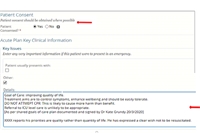08Jul
Capturing key medical information to protect the vulnerable during lockdown
During Alert Levels 3 and 4, acute plans were promoted as a solution to record decision-making, investigations, and goals of care that needed to be communicated to clinicians not familiar with the patient.
“This was a combined effort with the Shared Care Planning team and the Advance Care Plan team,” says Senior Project Facilitator at Canterbury Clinical Network Rebecca Muir.
An acute plan contains information about a person’s health condition and the recommended treatment if their health suddenly gets worse. It is especially beneficial for people who are likely to need emergency or after-hours medical care.
Health professionals can easily read, write and edit plans as appropriate, even if they are not the original author. The plans enable secure information sharing between hospital, primary and some community-based clinicians across the South Island.
Promoting acute plans during lockdown was essential as they are recognised as a key tool during uncertain times, Rebecca says.
“They’re used across the system and are intended to support decision making regarding the need for admission, investigations and the appropriate setting for acute care.”
During lockdown it was especially important that resources were used effectively to reduce pressure across the system and ensure the most vulnerable patients were managed as close to home as possible.
A small working group, formed from the Urgent Care Service Level Alliance group, pulled together data that identified patients who had previous hospital admissions in the last three years with chronic obstructive pulmonary disorder (COPD) flare-ups.
The patients’ general practices were contacted and encouraged to offer these people preventative and proactive measures.
These included:
- COPD blue cards (action plans) being sent to general practices
- flu vaccinations
- ‘back pocket’ prescriptions for antibiotics and prednisone
- acute and advance care plans.
St John was also asked to only transport patients with a severe flare-up of COPD to the Emergency Department. For all other cases St John was asked to call the person’s general practice team (urban and rural), followed by urgent care clinics.
“This was to ensure that all cases of mild or moderate exacerbations were managed in community settings,” Rebecca says.
(The above article was published in the CEO Update on 6 July 2020.)
About the Author
Related

When you’re not well it can be stressful and communicating is not always easy, which can sometimes ...
Read More >

CCN is proud to share that Shared Care Planning Programme Lead and Product Manager Rebecca Muir will...
Read More >

Kidney transplant recipient Don Saxon is grateful that he can look forward to time with his whānau ...
Read More >

The newest in the suite of electronic shared care plans, the Personalised Care Plan (PCP), went live...
Read More >

Canterbury Clinical Network Senior Project Facilitator Rebecca Muir presented at the Ō tātou hiran...
Read More >

With COVID-19 at the forefront of everyone’s minds, we’ve been exploring ways to increase the visi...
Read More >